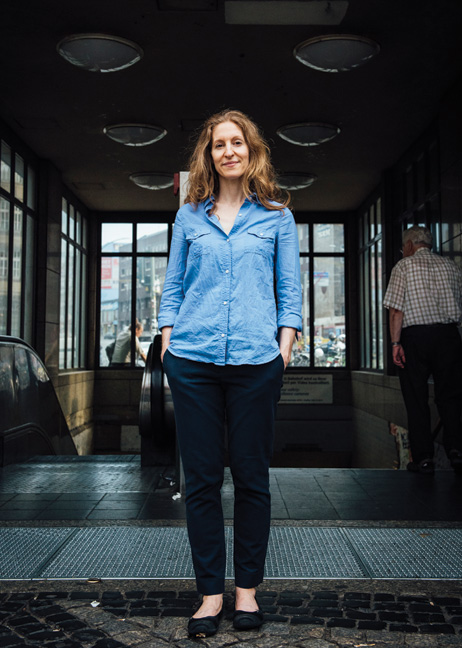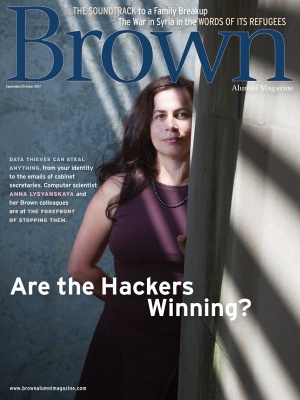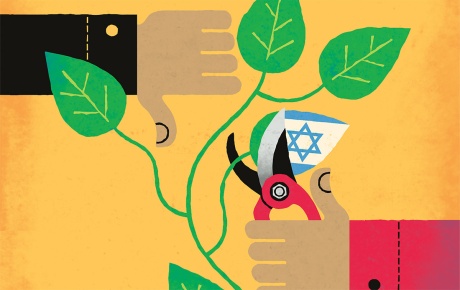Given the news this year about Syria—the suffering from bombs, air strikes, and nerve gas; the geopolitical implications of U.S. and Russian involvement in the country’s civil war; the assumption in some corners, including here in the United States, that Syrian refugees include terrorists trained to destroy the West—it can be difficult to remember that all this began in the dawning democratic light of the Arab Spring.

The Syrian conflict, which involves Russia, Iran, the United States, and the Islamic State, has huge regional and geopolitical ramifications. It has also led to the deaths of as many as 475,000 Syrians, according to one widely cited estimate. More than 6 million others are internally displaced, and another 5 million—the group Pearlman knows best—have fled the country. One important job for political scientists like her, Pearlman says, is to find big causal structures and generalizable patterns, but she says the approach can underplay “the human dimension of why it all matters.” In the case of Syria, Pearlman believes that people who’ve been following the civil war from afar may be so confused and, frankly, numb by now that they’re losing the ability to see refugees as human beings caught in a tragic, treacherous situation.
And so Pearlman, whose 2003 book, Occupied Voices: Stories of Everyday Life from the Second Intifada, collected the accounts of ordinary Palestinians in the West Bank and Gaza, went to camps and cities around the region where refugees resettled between 2012 and 2016 and conducted deeply personal, open-ended interviews in both Arabic and English. Instead of taking a strictly academic approach, her new book, We Crossed a Bridge and It Trembled: Voices from Syria, presents these stories as the human context behind the history that has led to today’s Syrian Civil War and its consequences.
Pearlman got the idea for the title from her interview with a man named Tarek, a doctor who’d lived in a Damascus suburb before escaping to Turkey, where she spoke to him. Tarek described how more than 100,000 demonstrators faced Bashar al-Assad’s forces and were doused with tear gas. (He helped his fellow protesters by pouring cola on their faces, “which counters the effect of gas.”) As they marched toward inevitable confrontation, he recounted, “I remember we crossed a bridge and it trembled underneath our feet because there were so many people.”
Many of the interviews depict this same combination of tragedy and determination. Represented in the pages of We Crossed a Bridge and It Trembled is a range of human experience. Pearlman’s subjects talk about surviving day to day under authoritarian rule, negotiating with family members over impossible choices, not knowing whether missing loved ones are alive or dead, decoding and resisting intimidation tactics, and waiting in vain for the outside world to set things right.
The stories are by turns expansive, matter-of-fact, reflective, and chilling. One recounts family members digging through mass graves in the vain hope of finding a relative’s shoes, their only way of identifying him. In another a man named Jaber is described as someone whose job was to find ice to preserve the bodies of victims who’d died in makeshift field hospitals. “And then,” Abu Tha’ir, an engineer, says, “Jaber was killed, and we couldn’t find any ice for him.”
Collecting the stories, Pearlman says, was a deeply emotional experience that evolved over time. After Pearlman interviewed a young woman in what seemed like a makeshift camp in Jordan in 2012, she asked her how she could find her again. The woman wrote down a street address for her tent. That was Pearlman’s first inkling, she says, that the situation was already evolving into something permanent. The following year she returned to the region and asked people about the uprising itself and how they’d broken the barrier of fear to speak out. A man with whom she’d become friendly told her, “You can’t keep asking them that question. You have to ask them about despair.” She says that was when she realized her interviews shouldn’t be dictated by research questions but should track the unfolding story.
Her early interviews were more optimistic, so she was too. But by 2013 she was listening to people “talking about horrific, nightmarish events.” She was so busy during her second trip that it wasn’t until she’d returned to the United States that “I felt like I’d been hit by a truck.” She put the work aside for a few months, regained some distance, and, following advice she’d received from a woman who’d gone through similar emotions while translating a book on the Holocaust, Pearlman tried to find that “middle sweet spot” between scholarly detachment and overload.
While they may not read like it, the accounts in Pearlman’s book have a larger academic purpose. The stories actually begin not with the stirring of resistance, but four decades earlier, with the ascent of Hafez al-Assad, the current president’s strongman father. In order to understand a protest movement, Pearlman argues, people need to understand what they’re rising up against. “It helps to see how [the regime] ruled by fear, by co-optation, basically creating a situation in which people felt like there was no purpose in criticizing because nothing would change,” she says.
As one Syrian who lived through that time described it to her, “We don’t have a government. We have a mafia. And if you speak out against this, it’s off with you to bayt khaltu [your aunt’s house]. That’s an expression that means to take someone to prison. It means, forget about this person. He’ll be tortured, disappeared. You’ll never hear from him again.”
Another said: “Teachers taught us that the Palestinian cause was the most important thing: that we have to forget our rights and all the problems in our country so we can fight Israel. My father always said those two things were not related. We can stand with Palestine and have a good country, too. I’d get very upset because what I heard at home was different from what I heard in school, but I couldn’t say anything about it.”
Then, starting in late 2010, came the exuberant protests in Tunisia and Egypt, which increasingly captured Syrians’ imaginations and eventually inspired them to act. “When it was announced that Hosni Mubarak had resigned—wow, I remember that day,” said Abu Tha’ir, who was interviewed in Jordan. “People went outside and started to talk. The words began to come out. They’d mention Egypt and say, ‘Grace be to God.’ They’d curse Mubarak and say, ‘He was held accountable. The Egyptian people are achieving a democratic government.’ People didn’t talk about Bashar. But inside, they wanted their own revolution, too. Outwardly, they just talked about Egypt. Inside they were moved, and had other thoughts.”
But the hope of peaceful change was short-lived. “People in all the surrounding villages heard about the massacre in al-Omari mosque and started coming to Daraa city,” Abu Tha’ir continued. “They entered, calling, ‘Peaceful, peaceful, peaceful.’ And then security forces opened fire on them. Imagine: This village has ten dead. This village has five dead. This village has three dead. This has two dead. This is how the revolution exploded in the entire province. The government sent dead to every village. The funerals began. And imagine, each funeral becomes a demonstration.”
As We Crossed a Bridge moves toward the present, one interviewee describes the revolution as a Pandora’s box that the country now needs to find a way to close. Another, a Free Syrian Army fighter interviewed in Turkey in 2013, seeks to explain how someone living through this horror becomes radicalized. “For every action there is a reaction,” he said. “When my sister is arrested and they rape her, I have no problem entering any place in the world with a car strapped with explosives. Because no country in the world is paying attention to me. Not a single one is doing anything to protect any fraction of the rights that I should have as a human being living on earth.”
A key moment in the timeline comes in the summer of 2013, two years into the violence, when a gruesome sarin gas attack by Assad failed to invoke American action despite President Barack Obama’s earlier declaration that the use of chemical weapons would be a “red line.” Pearlman was in Jordan at the time, interviewing Syrians in cafés and visiting homes where television sets blared the news.
“So when the intervention did not come,” Pearlman says, “many people felt like, ‘Okay, it’s over. It’s just never going to happen.’ It’s a sense of total abandonment by the international community, the whole world knowing what’s happening and standing by and watching the regime slaughter its own people.”
After growing up in Illinois and Nebraska, she studied history at Brown and then switched disciplines, earning a PhD in government from Harvard. She didn’t set out to focus on the Middle East; in fact, she had never left the country before spending her junior year at Brown abroad in Spain and nearby Morocco, which she saw as a way to experience two very different countries on one plane ticket. But her time in Morocco triggered a fascination with the Arab world. In the years since, she’s spent long periods visiting and living in the region and becoming fluent in Arabic (one country where she’s spent little time, ironically, is Syria itself, which she visited just once as a tourist a few years before the uprising began) . So while she’s focused much of her academic research on studying how political uprisings happened, she’s also picked up a lot from daily interactions.
“There’s something that we can learn about politics through the lived experience of politics,” she says. Pearlman chose the narratives in We Crossed a Bridge with that in mind, aiming to answer larger questions she finds American audiences have—who’s fighting whom, how did this all begin—and also “move them to care.” Pearlman wanted her book to bridge political explanation and storytelling, and describes this as something of a natural outgrowth of her experiences.
George Washington University political scientist Marc Lynch, who consulted with Pearlman as she was figuring out how to present her material, says that, while it’s professionally risky for an academic to publish something outside her discipline’s norms, Pearlman’s book fills in gaps left by more mainstream research on Syrian refugees. As he describes it, her ultimate approach was driven not just by her research interests but also by a concern over taking advantage of her “very traumatized” subjects. “She wanted to find a way not to use them. I’d rarely seen a political scientist do this. I’ve read books before that transcribe interviews. I typically don’t find them very compelling. Her real accomplishment is that she’s telling a pretty important political science story but in these people’s words. It’s kind of like fitting together a puzzle.”
Pearlman explains it this way: "It’s a work for popular audiences, which is not what political scientists normally do. But in a time of mass violence and atrocities, there are things more urgent than creating theories.”
With the book done, Pearlman has shifted her focus to the reality of long-term displacement for Syrian refugees. She’s two years into a three-year fellowship that has taken her to Berlin in the summers, where she’s learning German and following the country’s mostly open-armed welcome of almost a million Syrians.
“I think it’s still an experiment. I meet refugees who two years later are still living in shelters. I hear lots of negative complaints but also amazing stories,” she says. For some refugees, she adds, “There’s a personal sense of, ‘I want to go back to my homeland.’ There’s a political sense of ‘I have a duty to go back and rebuild and achieve this dream of a free Syria.’ For some it might just be painful enough to say, ‘I need to look forward.’”
She notes the contrast between Germany and the United States, where a relative handful of refugees have been accepted and where they’ve become the subject of alarmist political rhetoric. She said she hopes her book might be able to break some of the anti-refugee fever, to counter the “tremendous unfairness” that people fleeing violence and injustice are suspected of being perpetrators, without being given a chance to represent themselves.
“Millions of Syrians risked their lives for something called democracy, for the rule of law and accountability,” Pearlman says. “It’s just so cruelly ironic that there would be a thought that these people aren’t ready to respect our freedoms. They have sacrificed more for freedom than most of us can even imagine.”
Contributing Editor Stephanie Grace is a political columnist for the New Orleans Advocate.





